Account Login
Don't have an account? Create One
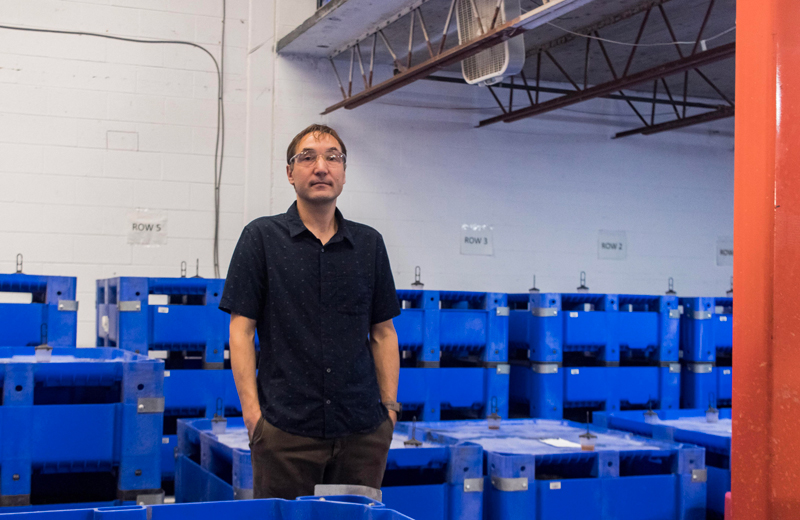
Driving the winding backroads between Halifax and Centre Burlington, Greg Wanger, CEO of Oberland Agriscience reflects on the unlikeliness of the journey we’re charting. Behind us, Oberland’s insect farm, one of only a handful in the country, where compost is turned into protein. Ahead, Sustainable Blue’s land-based salmon farm, unique in the world for producing no discharge.
If people know these companies exist in Atlantic Canada at all (he says the folks he talks to are often surprised), they might be even more surprised to learn that they’re connected. In Nova Scotia, six like-minded businesses—Oberland Agriscience, Sustainable Blue, Sustane Technologies, Smallfoods, Skaldyr and ROCarbon—are working together to tackle challenges in the region and beyond.
“It’s been a wonderful place for us to integrate as quickly as we have,” Wanger says. “We are further along as a company because we are out here, and because of the close network that we have, than I think we would be if we were anywhere else.”
This informal network doesn’t have a name; it’s described by the people involved as an industrial ecosystem. Still, it faces the same challenges as any start-up… the staff required to build their vision… the funding that allows them to scale.
But being small—as businesses, and as a region—has its advantages too. As Canada looks for solutions to its most intractable environmental problems, companies say the network could serve as a model for bridging the gap between the innovations that can fix our relationship with the planet, and the scale of implementation needed to make a difference.
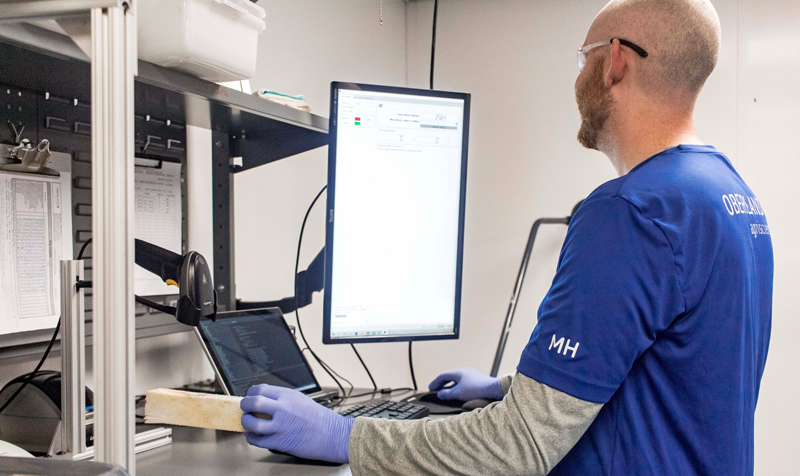
Beside a shared interest in saving the planet, if there’s one thing that ties these companies together, it’s waste. “It doesn’t just go away— it actually causes a lot of problems, it’s a challenge for municipalities and for society,” says Wanger.
The scale of that challenge can be obscured by green bags and blue bins, but even where waste is diverted to compost or recycling programs, much of it still ends up in landfills. In some cases, it’s estimated that as much as 80 per cent of ‘recycled’ material actually ends up in the dump.
But companies say there’s another way to redirect that waste. In Oberland’s case, spent grains from local breweries are used as feed for black solider flies, an omnivorous insect that can grow 8,000 times its size in a little over a week. “One of my employees did the math, and that is equivalent to a human infant to a humpback whale in 10 days,” says Wanger.
At the moment, Oberland goes through three tonnes a week of organics, but they’re in the process of expanding to a new, fully renewable-power facility across the street, where that capacity will increase to 100 tonnes a day. While the ultimate intention is to use post-consumer organics (meaning the material that goes into the green bin) as the base of these operations, that has been stymied by ongoing issues with people putting things in the compost that don’t belong there, including plastic and other trash.
Working with Chester-based recycling company Sustane Technologies has offered a solution.
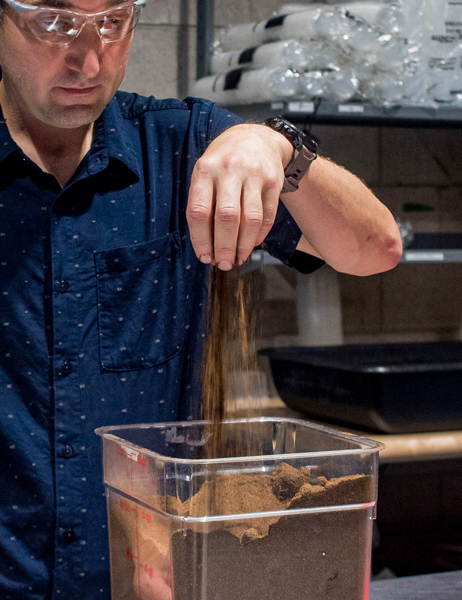
Sustane’s facility aims to divert waste from the Municipality of Chester’s landfill by separating garbage—particularly garbage that can’t otherwise be recycled or composted—into reusable plastic, fuel and organic pellets (since roughly half of all waste, including garbage, is organic). Their process, which separates plastic and other inedible substances from organic waste, would allow Oberland to use post-consumer organics, creating a feed that’s more efficient than the spent grains Oberland is current using—a serendipitous discovery that emerged out of a shared willingness to experiment.
“We didn’t know that. We just thought ‘oh, let’s try it,” says Sustane Technologies’ CFO Fraser Gray.
Sustane’s own plans are not without hurdles; at the moment, the part of the plant that processes organic waste is not working as hoped, so the company is operating only the portion that turns used single-use plastic into a base for new plastics, while they engineer a fix. In the longterm, Gray says Sustane’s process could help solve a tricky problem for municipalities—and for like-minded businesses.
“Oberland can do this without Sustane,” he says. “But they’d be way stronger with us, because we can purify this massive stream of post-consumer waste.” The possibility of being stronger together works at the other end of this ecosystem, as well.
At Sustainable Blue’s land-based fish farm, near the Minas Basin, large Atlantic salmon swim against the current in large tanks. Chief sustainability officer David Roberts sprinkles flakes made from insect protein on the water, and a couple of fish swim to the surface to investigate.
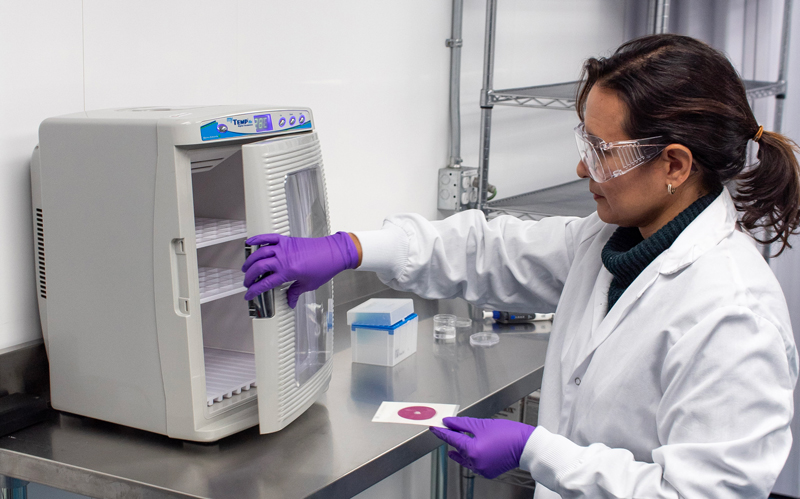
This facility has the capacity to produce 1,000 tonnes of fish a year. Doing so in a truly sustainable way requires replacing the standard feed, which largely comes from depleted forage fish stocks (in Canada, just six per cent of forage fish stocks are considered healthy, for instance). They would need to replace it with something that allows the company to live up to its goal of being fully zero waste.
“We’re looking for systems that use waste products from our existing industries, so they’re not impacting the food chain anywhere,” says Roberts. “That’s where we all play together.”
Working with researchers from Dalhousie University, Oberland and Sustainable Blue are in trials to test feed made from soldier flies as a replacement for fish meal, as well as a feed derived from fermented micoalgae, by local company Smallfood. Roberts says this allows the company to replicate salmon’s natural diet, without taking anything out of the environment.
“It all fits together because we’re not introducing anything that’s not found in nature.”
That said, there are things that need to be put into the environment (in many places, intensive farming has stripped nutrients from the soil), which is why many of the companies in the network are using waste to build back soil health. This includes trials with a local farmer to assess the use of fish and insect poop, as well as recycled cellulose, to stimulate the production of crops such as lettuce, strawberries and cabbage.
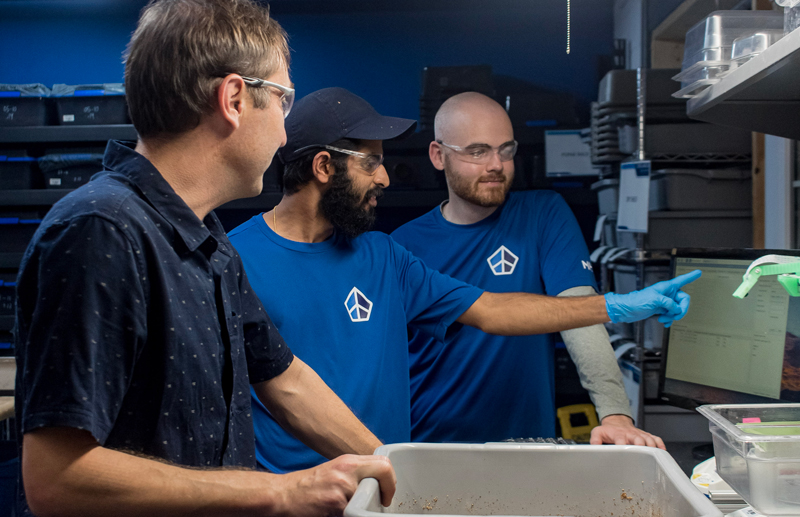
The waste from processing salmon itself (i.e. the bones and viscera) goes to Sydney company Skaldyr, who turn it into nutritional supplements and other products. The carbon inputs and outputs are quantified by Halifax-based ROCarbon, which sells offsets to help companies accrue capital.
“It sounds easy to put together, but it has its nuances, which takes time to develop, particularly at scale,” said Roberts. “We need to do it at tens and hundreds of thousands of tonnes of production if we’re going to bring this online without impacting other areas.”
Sustane Technologies’ Fraser Gray says the challenges to this growth are similar to those faced by any emerging business, including attracting sufficient staff—a challenge not unique to these companies. A recent report by RBC estimates that starting in 2025, Canada could see a deficit of about 27,000 environmental workers.
Finding stable funding, as they move beyond the pilot phase to full commercialization is another hurdle. There’s government support for research, and for established businesses, but less available for those in the middle.
“All of these companies…are facing a similar problem: we’re not fully mature, industrialized conglomerates that have huge amounts of revenues. We’re all startups of various types,” said Gray.
Still, being small has allowed companies to integrate their operations. In the future, Gray thinks this approach could allow companies to further reduce their environmental footprint even as they expand together. They could do this by offering a system that’s completely circular, where Sustane’s technology sorts and processes waste, Oberland’s insects turn that waste into protein, and Sustainable Blue fish turn the protein into human food.
“This is the village coming together,” Gray says. “And what better place than Nova Scotia to do that?”
Similar Articles:
Comment policy
Comments are moderated to ensure thoughtful and respectful conversations. First and last names will appear with each submission; anonymous comments and pseudonyms will not be permitted.
By submitting a comment, you accept that Atlantic Business Magazine has the right to reproduce and publish that comment in whole or in part, in any manner it chooses. Publication of a comment does not constitute endorsement of that comment. We reserve the right to close comments at any time.
Cancel